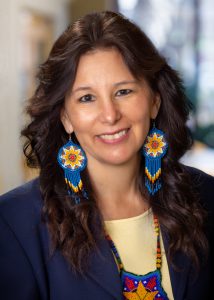The Native American Law and Sovereignty Institute at Mitchell Hamline School of Law in St. Paul, Minn., recently won faculty approval for a new certificate.
Certificates are focused tracks within the J.D. program to allow law students to specialize in a field of law and graduate with practice-ready skills. The Native American Law and Sovereignty Certificate allows students to explore the cross-cultural fields of Native American law to include Indigenous legal principles, tribal law, federal Indian law, and the relationships between Tribal Nations and other governmental entities and systems.
Through this certificate, students will gain foundational skills to practice in legal settings and fora involving Native American law. The term Native American law is the most inclusive to encompass American Indians, Alaska Natives, Native Hawaiians, and other Indigenous peoples of North America.

Professor and NALS Institute director Angelique EagleWoman
“We have strong student interest in the certificate for our institute with over 40 students enrolled in the pre-requisite Native American Law course for spring 2022,” said Director Angelique EagleWoman (Sisseton Wahpeton Oyate). “By offering a certificate, we will now be recognized as a full-fledged Native American law program nationally with the National Native American Bar Association and the American Indian Law Center which will attract prospective students to Mitchell Hamline who are seeking to gain this expertise.”
The institute builds on a history of commitment to the law that impacts and is created by tribal governments, a commitment stemming from both of Mitchell Hamline’s legacy schools and involving preeminent law professors over the previous two decades.
“Mitchell Hamline recognizes the important role of Tribal Nations as part of the fabric of the American democracy, and it is through this commitment that the NALS Institute has a welcome place within the law school’s family of centers and institutes,” said President and Dean Anthony Niedwiecki. “Our school has a national reach and law students from Tribal Nations in almost every region of the country.
“The presence of Native American law students enriches class discussions, allows for cross-cultural engagement with legal materials, and moves forward the law school’s commitment to meeting the needs of contemporary society through its antiracism efforts.”
Current students offered their support for the certificate, many noting they would be interested in pursuing the specialization themselves. “I chose Mitchell Hamline primarily because of the availability of Native law courses,” wrote 2L Kristi Corcoran, in an email. “It is a passion I can only fully explore at this school.”

GeWaden Dunkley, president of the Native American Law Student Association at Mitchell Hamline
GeWaden Dunkley (Bois Forte Band of Chippewa), a 3L who is president of the Mitchell Hamline Native American Law Student Association, said the certificate would “not only support the past work Native students and faculty have done but also make a statement that Mitchell Hamline stands by this work and is an ally moving forward with the many Native issues and legal battles to come.“
A variety of topics are covered in the course offerings to complete the certificate, for which students must complete 18 credit hours. Three foundational courses focus on the historical and legal framework of the Tribal Nation-U.S. relationship; an opportunity to conduct legal research focused on tribal topics; and advanced topics on Indian gaming law, natural resources, pipeline litigation, and other pressing issues.
Certificate students may choose to take the Native Law Clinic: Tribal Code Drafting, which provides a small-firm simulation allowing students to work directly with in-house counsel at tribal governments to write laws, regulations, and other legal documents supporting tribal sovereignty. The certificate also includes courses on international Indigenous law and the Indian Child Welfare Act.
With the certificate, Mitchell Hamline joins approximately 17 other national Native American law programs meeting the need for legal practitioners in this field of law.
“Mitchell Hamline is physically located on treaty lands of the Dakota peoples and continues to lead the way in legal education on the importance of tribal governments and U.S. relationships,” added EagleWoman. “By completing the certificate, students will have skills, knowledge, and tools to take back to their home tribal communities or to work as allies on the tribal, state, or federal level.
“There is never a lack of legal positions in a field with over 570 federally recognized tribal governments.”
Related: Mitchell Hamline welcomes record number of Native students (Oct. 2021)
See also: Mitchell Hamline debuts video explaining the application process (Nov. 2021)
